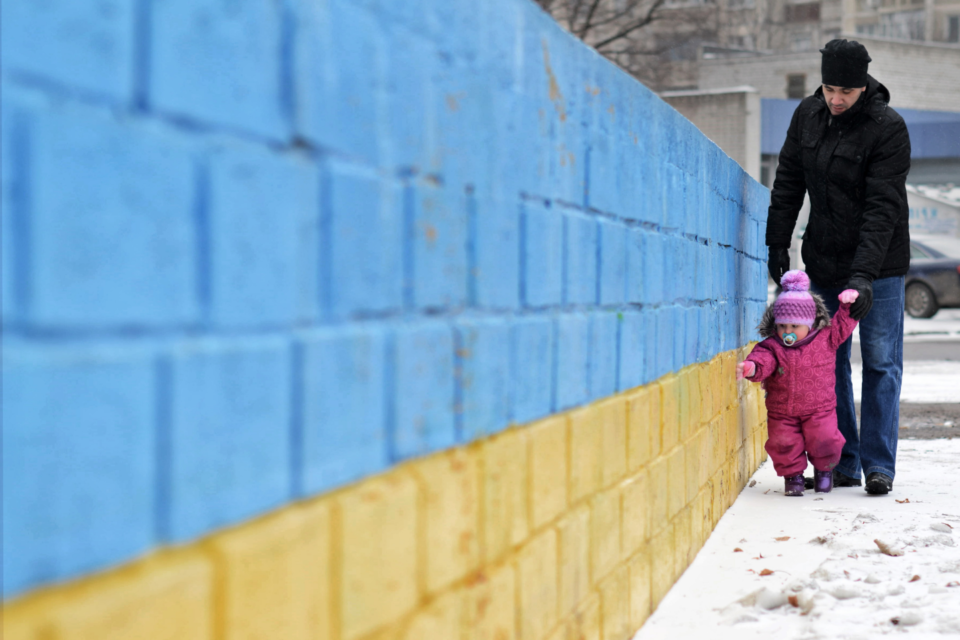The conflict in Ukraine is still continuing, after a month of aggression from Russian forces. In this blog Dr Jenny Hall, midwifery editor, reflects on the portrayal of birth in the news outlets and impact on maternity services, pregnant women and their families.
“In times of conflict, war, poverty or religious fundamentalism, women and children are the first and most numerous victims. Women need all their courage today”. Isabel Allende
As I write it is one month since Russian forces invaded Ukraine. Over that month the news outlets have been full of images and stories of the conflict. From films of the president reaching out to other governments for help, to buildings crumbling under bombardment and interviews with soldiers we have been drawn into the horror of war.
The impact of the conflict is increasingly on those who are not fighting, on the women and children and vulnerable. It is these other images that are pulling most at the heart strings. We follow the lines of refugees as they flee to safety. The United Nations state that around 10million people have left their homes, 3.6million to other countries. For these people the effects of displacement, grief at loss of home, friends and family, loss of stability, fears for the lives of their partners left fighting, will be long reaching.
We also are seeing other images: the bombing of a maternity hospital, pregnant and labouring women being pulled from the rubble and transferred to underground bunkers; stories of births being shared on social media, lacking in equipment, lacking in privacy. Births don’t stop. Pregnant women and newborn babies are being used as a contrast to the negative- the trauma these women are experiencing are used a sign of hope in the darkness.
The reality is that pregnant women, not able to travel, to run away, have been left behind to face the trauma of bombardment. Health care professionals, midwives included, are also left behind working in limited conditions with no electricity, no water, and no prediction of what will happen next. Reports from Dr Iryna in Kharkiv, who took over David Beckhams Instagram this week, described the conditions in which they are working, amidst the threat of shelling. She states: “We are probably risking our lives but we don’t think about it at all. We love our work. Doctors and nurses here, we worry, we cry but none of us will give up.”
The World Health Organisation has estimated around 80000 births are expected for Ukraine women in the next three months: 1000 per week. Not all these births will now be in Ukraine though, as a number of pregnant women may have crossed borders. It is suggested nearly 200 births have occurred in Poland alone. This will mean other countries will also need increased resources to cope with the increasing births amongst the refugee population, including the need to care for the shock and trauma of the experience they have had. The International Confederation of Midwives raises the concerns at the increased risk of abuse of refugees and points to resources to support services in receiving countries to care effectively.
Other stories have been of babies, born to meet a surrogacy contract, but left waiting to be picked up by parents from other countries. In the Ukraine surrogacy is legal and supported. The name of the new parents is included on the birth certificate, whereas in many the birth parent is recorded. This means it is quicker to obtain a passport and visa for the infant to leave Ukraine. Babies are being cared for in the clinics where they have been left, waiting for their new parents to travel to pick them up. A nurse said on the news that usually their job was to teach new parents how to care for the babies: instead, they are now caring for them amidst the bombardments taking place.
Disturbing is the reported rise of preterm births in Ukraine, double to three times the usual rate, suggested to be as a result of stress and trauma. Small and sick babies are being cared for in the ward areas during bombings as it is not possible to get them to safety in the basements. Staff stay alongside them to care.
In amongst the stories is a trained nurse and midwife, Wendy Warrington, from Bury, Lancashire is volunteering with a medical team near the border of Poland as a first responder. She is working alongside local teams supporting and transporting refugees and aims to set up a clinic to reassure pregnant and postnatal women. There will be more to hear from Wendy in the future, but she highlights how midwifery is needed even in war zones. To help birthing equipment for straightforward and complicated births in the community has been shipped out to Poland via the charity Baby Lifeline.
Behind all these stories are real women, real families, real staff who are facing adversity. There will no doubt be stories of heroism that will come through in time. Though birth and new life is still going on in the horror of war, the reality is, human life is at stake.
“ The most shocking fact about war is that its victims and its instruments are individual human beings, and that these individual beings are condemned by the monstrous conventions of politics to murder or be murdered in quarrels not their own. ” Aldous Huxley
Dr Jenny Hall, Editor, MATFLIX
April 2022


